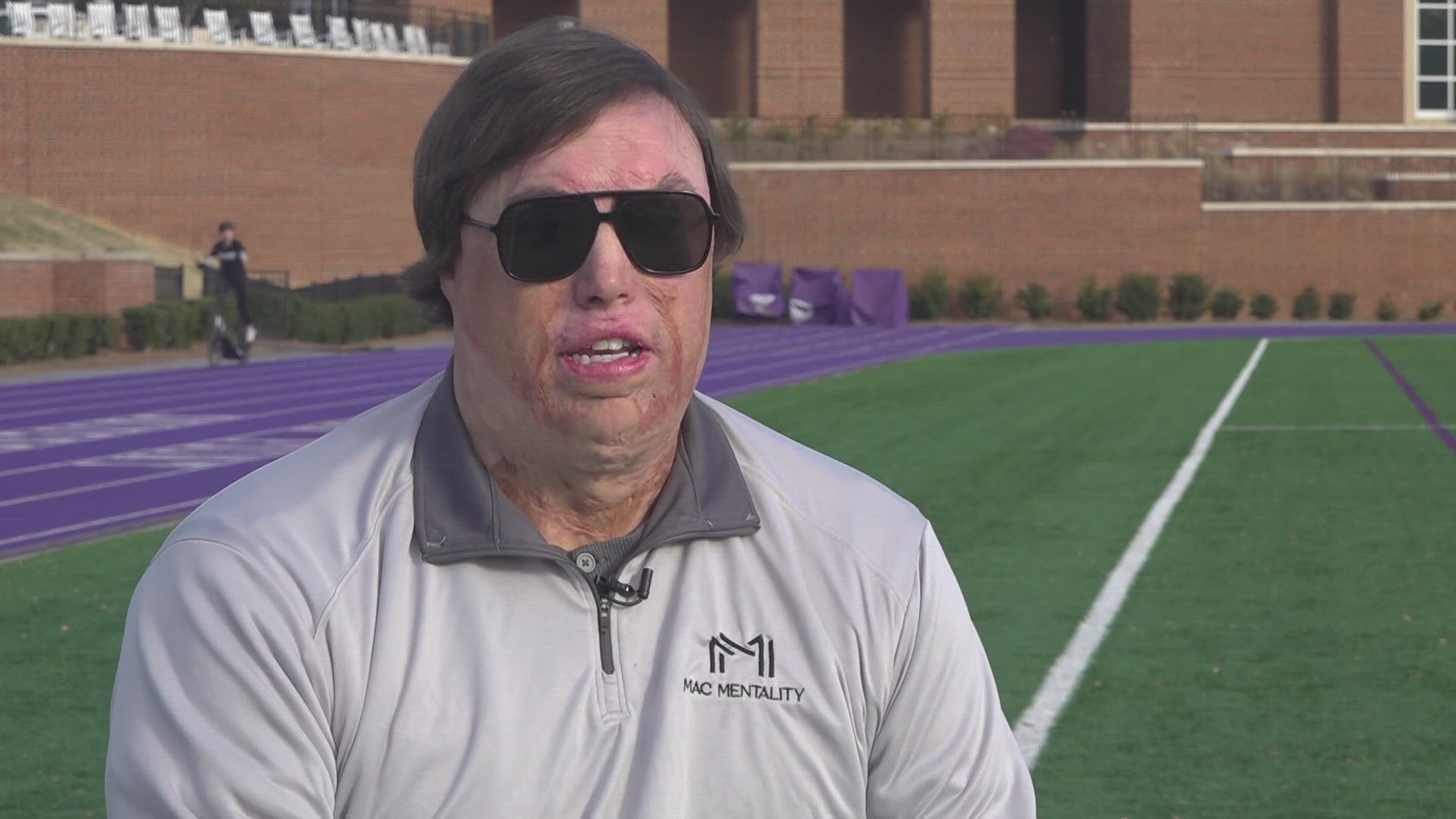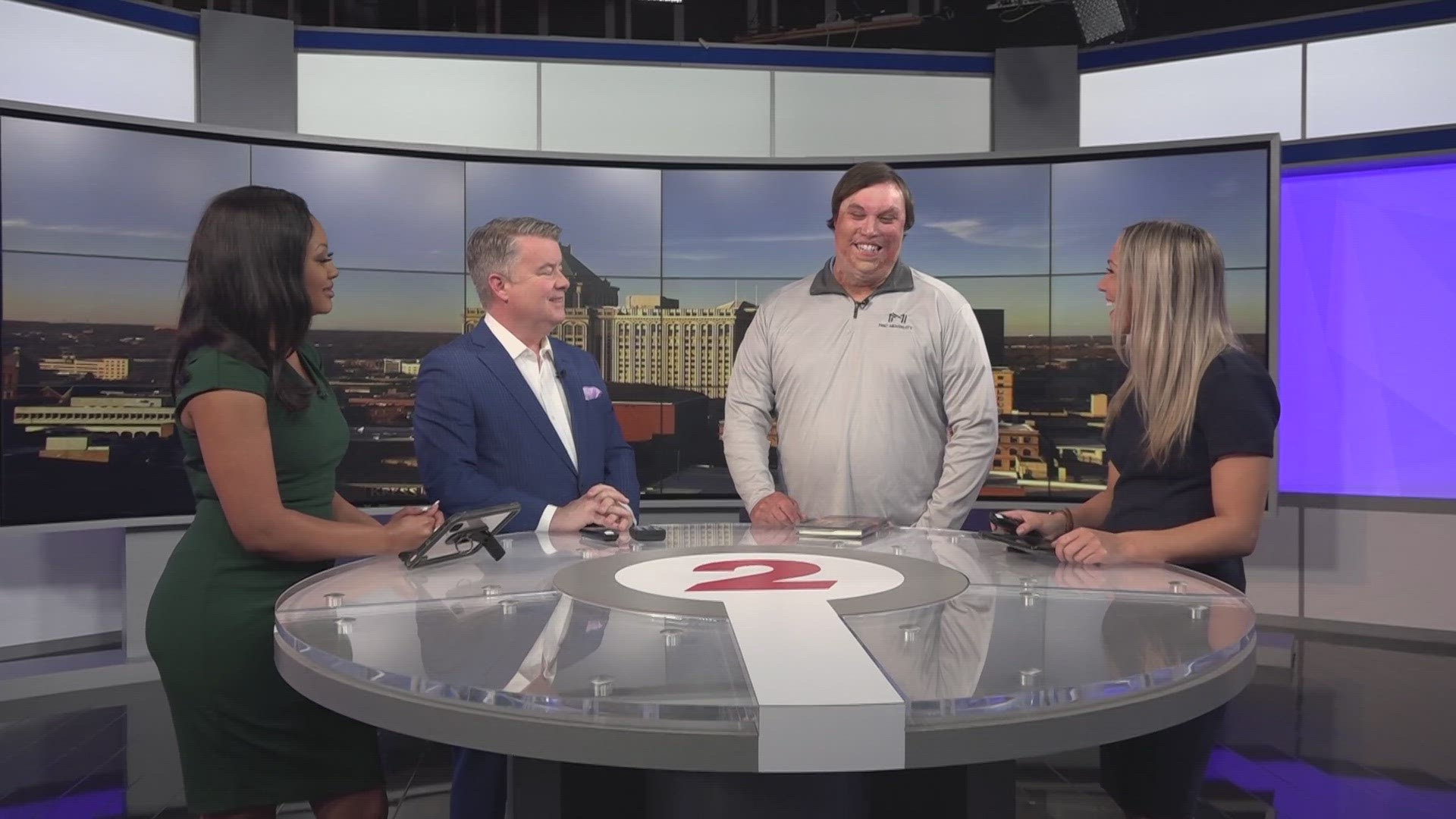HIGH POINT, N.C. — It's been 15 years since an explosion changed Connor McKemey's life forever.
"I grew up small town south of Charlotte with an older brother and a younger brother," said Connor McKemey. "My mom taught at our high school and my dad was in the Navy, so it wasn't like we had a ton, but we were very close and we just loved playing sports."
At 13 years old, Connor McKemey was full of life and a very active teen. He played football, basketball, and lacrosse.
"I was the quarterback of the football team, on the basketball team, and a pretty good lacrosse player, and my eyes were set on playing at the next level. I would have loved to go pro," said McKemey.
Those dreams though came to a halt. After planning a date at his house for his crush at the time, things took a turn.
"There was this really nice girl that I wanted to impress. So as a kid, who didn't have a job and couldn't drive, we had this little fire pit outside. We had some lights out there and I thought, 'let's have a romantic evening'. That was like our first real date and so I wanted it to be special," he said. "In my haste to get the fire started that night before she came over, there was an explosion and it caught me on fire from head to toe, and really before I knew it, I was padded out and pushed down, and just as I opened my eyes, I saw the skin peeled back, my shirt missing, and at the time, you don't know how bad it is, but you could tell from the looks of the EMTs and everybody that was there that wasn't in good shape."
He said the fire exploded and he was immediately sent to the hospital. Over 90% of his body was burned and he was given less than a 1% chance of survival.
"I tried to maintain positivity, just telling everybody I would be okay as I was putting the back in the ambulance, but before I knew it, it was pretty much cut to black," he said. "Really, they were just trying to keep me alive long enough, so my dad who was in Iraq at the time could come home to be there and see me one last time. I can't imagine you know how difficult it was for my parents when they were staring at their 13-year-old and thinking the rest of his life is completely different than anything he ever knew, let alone just hoping that you'd be alive."
McKemey was in a medically induced coma for three months, had two years of rehabilitation, and had more than one hundred surgeries, but this did not stop him.
"Being 13, being young being a little stubborn and naive, like I didn't realize how bad it was and all I kept asking you know when I finally could talk again was when can I get back to school? When can I go back to playing sports," he said. "It wasn't until they allowed me to see for myself that I couldn't move that I couldn't walk, I wasn't strong enough."
He said he lost about 40-50 pounds in those three months.
"The pain was you know too much to deal with at certain times and I had to heal, I had to wait for the graph to heal and everything else and as I sat there, it was just making sure that you know, I tried to keep my spirits up," he said. "I was blessed to be surrounded with great friends and family and all sorts of love from the community people, sending letters and cards and everything else and so I just felt like there was a lot more force behind me than just my own and that to me was the biggest first step because you just felt like you had all these people there rooting for you and supporting you it just made the change a little bit easier."
McKemey had to learn how to walk again, but after growing his strength, he was back in action playing high school sports.
"If I could just get one step further, do one more rep, then eventually those things would add up, and before I know it that led to taking a step, which led to three, four steps," he said. "Then I just kept going and kept going and each day I was just trying to push a little bit further."
He said it was important not to set deadlines for his recovery but that if he could make progress each day, he was accomplishing the impossible.
"I had to take a mind shift, going from not focusing on what I lost, but what I was gaining, because it was so easy to say I can't do this, I can't do that, but when I started focusing on living in that moment and trying to find those moments instead of dwelling on that negativity and dwelling on that loss, it helped me realize all I could change is what was going to happen next and so I just tried to put one foot in front of the other literally."
McKemey later played DI lacrosse at High Point University and also coached for four years there.
"I wanted to play college lacrosse, I wanted to be a coach and I went out and I did those things, and when I finished my career here at High Point, I ended up coaching here for four more years," he said. "I was doing exactly what I wanted to do. I loved where I was and I was super content and happy but there was a little voice in the back of my head that sat there and that had me thinking, is there more that I probably could be doing? Because listen, I do have a unique story. I have a unique platform and selfishly I was happy and content but there's so much more that I probably could contribute to people that really need it."
Now he is turning his story into a way to help those battling mental health challenges.
He is now a motivational speaker who runs his own business and travels all over the world to share his story. It's called Mac Mentality.
His goal is to help others overcome everyday challenges through a positive mindset.
"It's okay to feel sad and it's okay to have bad days, but that's not the end goal," he said. "There's hope out there, there is belief out there. I went through something traumatic, but everybody's fighting battles, and if I could use the perspective that I gained to provide some positivity to those people, then that's what I needed to be doing."
He said it took 2020 to take him away from his normal cycle of waking up, going to work, and returning to see the bigger picture.
"The biggest weapon I had was my mindset, my mentality and I think for so many people, our mental health is not at the forefront when we think about our overall health and overall well-being," he said. "I've lost people to suicide, everybody has, and if we could start changing some of those statistics and reminding people that look there's a bigger picture here. There's more to life than you know, just the hard times and that's what I wanted to do."
He has released a book called, 'Life Ignited,' which it talks more in detail about his life.
This December marks 15 years since the explosion happened.


